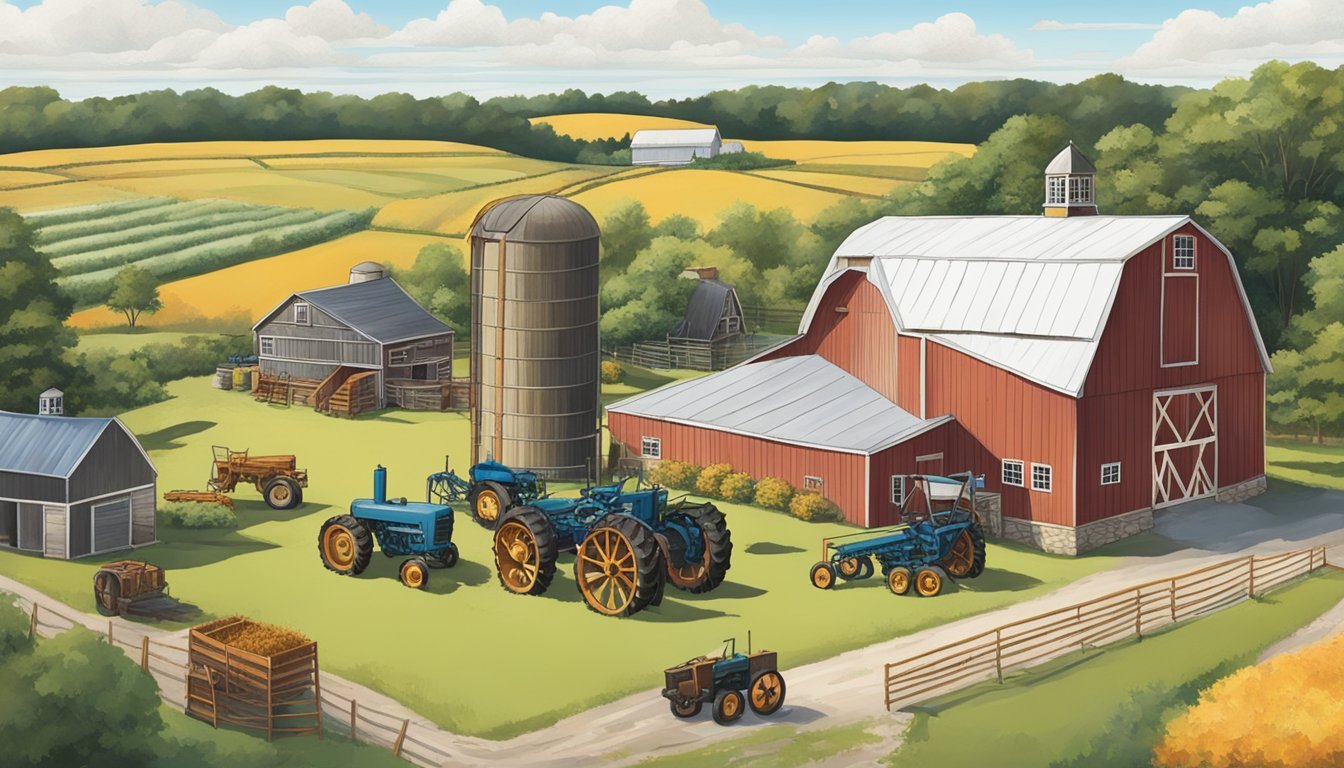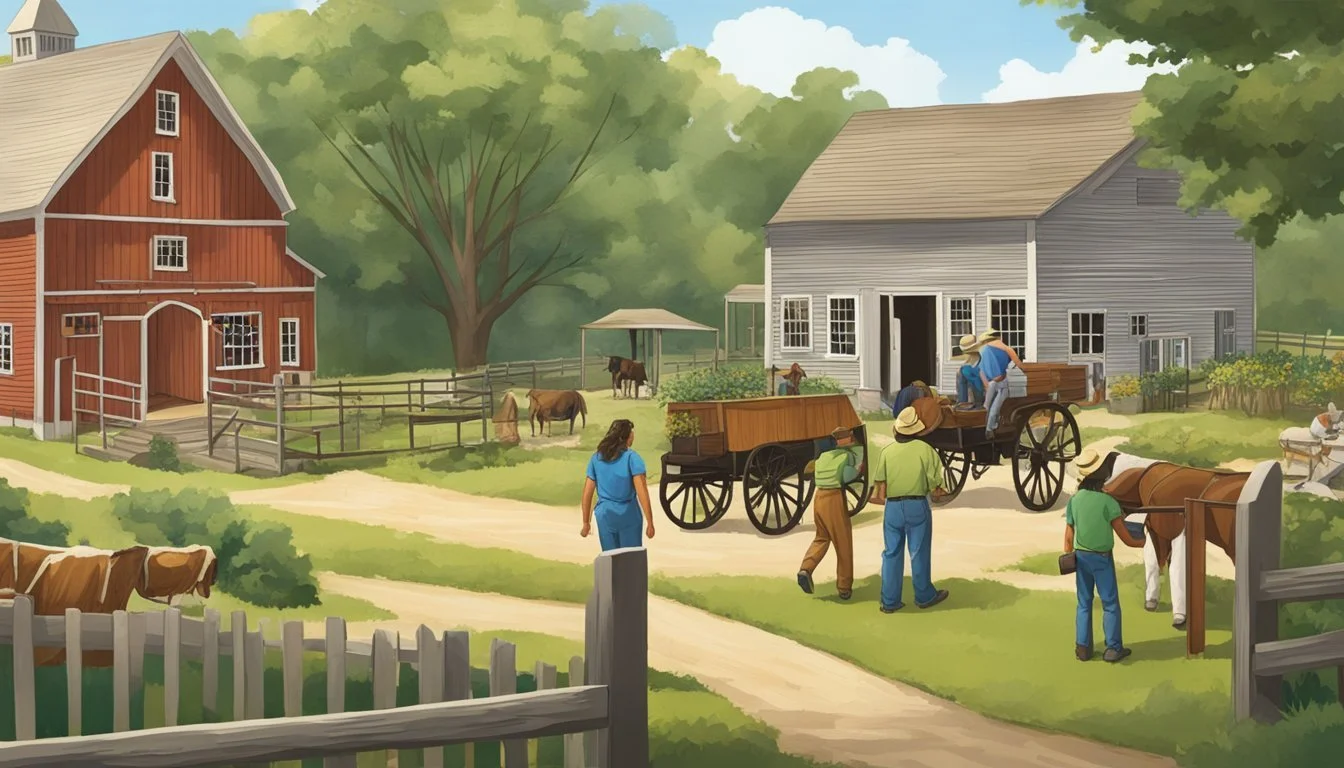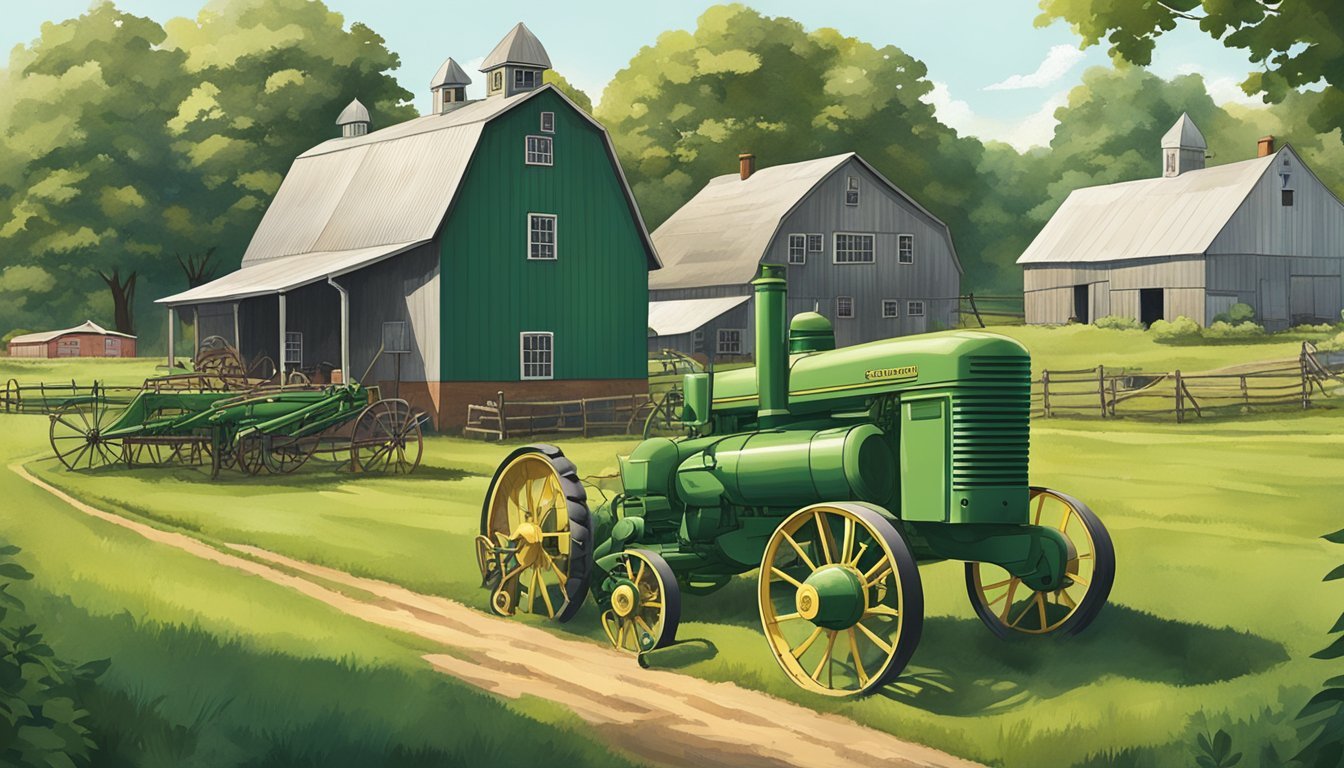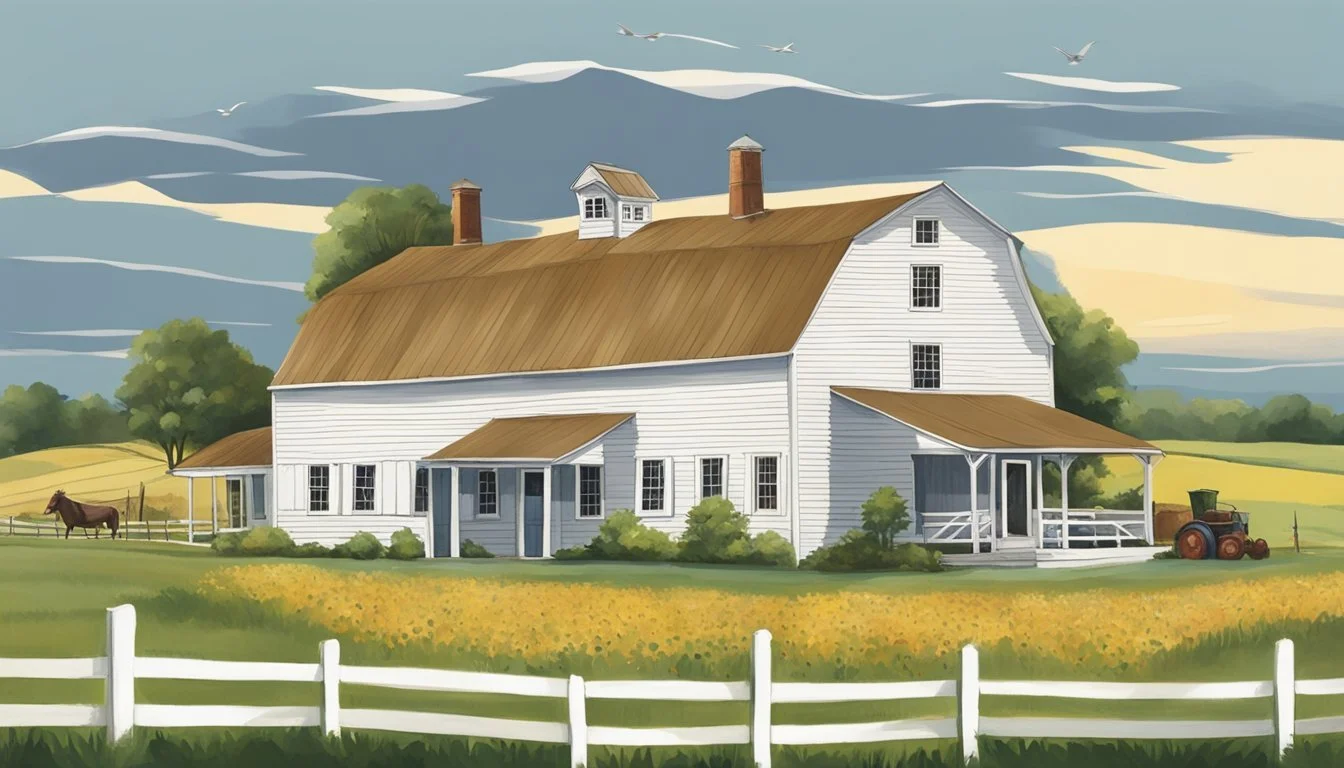Historical Farms and Agricultural Museums in Delaware
Exploring Rural Heritage and Practices
Delaware's rich history is intricately tied to its farming and agricultural heritage, a legacy that has shaped the state's industry and culture. The state, small in size but vast in historical significance, has been a witness to agricultural evolution from family-owned farmsteads to the larger industrial farms we see today. Notably, agriculture has been at the core of Delaware’s economy for centuries, with historical farms dotting the landscape and telling the stories of generations past.
Several historical farms have played pivotal roles in the state's development and continue to influence its cultural identity. Places like the Newton Orchards in Bridgeville and Delhaven Farm in New Castle are living testaments to Delaware’s commitment to preserving its agricultural history. Moreover, the Delaware Agricultural Museum and Village provides visitors with a tangible link to the agrarian way of life with its extensive collection of artifacts and historical structures that offer a glimpse into the rural life of the 19th century.
As these sites bridge the gap between the past and present, they not only educate but also inspire a sense of appreciation for the trials and triumphs of the state's early settlers. The prominence of poultry farms, such as those in Selbyville, has also been recognized as part of Delaware’s central narrative in agriculture. Together, these elements combine to form a rich tableau that tells the story of Delaware's agricultural might and its undying influence on the state's history and culture.
History of Agriculture in Delaware
Delaware's agricultural sector has a rich heritage, with a history that intertwines closely with the state's development. Farming practices and the industry have evolved over the centuries, from the subsistence agriculture of the early settlers to the large-scale poultry farms that have made a substantial impact on the state's economy.
Early Farming Practices
The introduction of farming to Delaware traces back to the first Dutch settlers in 1631, followed by Swedish settlers in 1638. These pioneers established the groundwork for Delaware's agricultural traditions, cultivating essential crops such as wheat, barley, Indian corn, and peas. Livestock, including pigs, sheep, goats, and cattle, were also raised, providing meat and milk, a bedrock for survival and economic stability in the region.
Agricultural Development and Change
As Delaware progressed, so did its agricultural practices. The John Dickinson Plantation, helmed by a founding father of the United States, was a hub of activity before and after the Revolutionary War. Here, both free laborers and enslaved black men worked the land, highlighting the complex history of labor in agriculture. Over the years, the state became known for its advancements in farming techniques and the integration of more mechanized forms of agriculture, reflecting the changing times and technologies.
Famous Historical Farms
Delaware boasts several noteworthy farms that have left a mark on its industry. Notably, the Delaware Agricultural Museum and Village preserves the state’s agrarian legacy, offering insights into Delaware's farming evolution. Poultry farming rose to prominence in the state, with facilities like Hillside in Selbyville that have underscored Delaware's reputation for quality chicken production. These establishments not only represent significant pieces of the state's agricultural past but also stand as symbols of adaptation and progress in agricultural methodologies.
Delaware Agricultural Museums Overview
Delaware proudly preserves its rich agricultural past through various museums, each showcasing different aspects of rural life and the state's farming heritage. They provide educational experiences and house numerous engaging exhibits.
Delaware Agricultural Museum
The Delaware Agricultural Museum in Dover gives visitors a comprehensive look at the First State's farming past. The main exhibit hall houses an array of artifacts that demonstrate the evolution of agricultural technology. Outside, a reconstructed 1890s village named Loockerman Landing brings history to life, complete with historic structures and a glimpse into the daily life of Delaware's rural communities.
John Dickinson Plantation
At the John Dickinson Plantation, one steps back in time to the 18th century. This historical landmark was the boyhood home of John Dickinson, known as the "Penman of the Revolution." The plantation offers a detailed look at colonial agriculture, social history, and the importance of agriculture in the era leading to the American Revolution.
Zwaanendael Museum
The Zwaanendael Museum commemorates the Dutch settlement of Delaware in 1631. Showcasing local maritime, military, and social history, the museum approaches these topics from the unique perspective of the agricultural community's interactions with these elements. The museum's exhibits and galleries pay tribute to the region's cultural heritage, influenced by the Dutch and other European settlers.
Educational Programs and Tours
Delaware's agricultural museums offer a rich array of educational programs and tours, catering to various age groups and interests, ensuring that both school children and the general public can gain deeper insights into the state's farming history and practices through engaging and informative experiences.
School and Group Tours
The Delaware Agricultural Museum and Village provides specially curated opportunities for students to immerse themselves in Delaware's agricultural past. These educational tours are designed to complement the curriculum for elementary, middle, and high school students, offering hands-on exploration of rural heritage.
Public Programs and Events
Throughout the year, the museum hosts a series of public programs and events that celebrate and educate the community on the importance of agriculture. These events range from seasonal festivals to historical re-enactments, engaging individuals and families alike in a communal learning atmosphere.
Workshops and Demonstrations
For a more interactive learning experience, workshops and demonstrations allow visitors to witness agriculture in action. These programs emphasize skills and traditions from Delaware's farming history, providing both children and adults the chance to observe and sometimes participate in activities such as crop harvesting or blacksmithing.
Cultural and Technological Impact
Delaware's farming history is rich with technological progress and cultural shifts. The state's agricultural sector showcases a legacy of inventive practices and social dynamics that have shaped its communities and economy.
Agricultural Inventions and Innovations
The story of Delaware agriculture is marked by numerous key inventions and advancements. Notable among these are improvements in poultry farming processes, exemplified by innovation-centric farms such as Steen's Poultry Farm, which helped propel the state to the forefront of the chicken industry. Such innovations are a testament to Delaware's contributions to American business in the realm of poultry engineering and technology. Additionally, these advancements have had a ripple effect across various facets of the agricultural industry, elevating standards and prompting nationwide adoption of improved farming methods.
Impact on Delaware's Social History
Agriculture has been a backbone of Delaware's social fabric since its earliest settlements. The industry not only fed the population but also established Delaware as a participant in the wider American economic and cultural narrative. Institutions like the Delaware Agricultural Museum and Village preserve this heritage, illustrating the intertwined relationship between Delaware's agricultural practices and its community's evolution over time. The progression from early subsistence farming to large-scale operations reflects both technological growth and significant shifts in social structures, such as the transformation of rural communities and the advent of modern agribusiness.
Agricultural Heritage Sites
Delaware preserves its rich agricultural legacy through various historical farms and museums, offering insights into the state’s past and rural traditions. The following heritage sites are key destinations for understanding Delaware's agricultural narrative and its impact on the region's development.
Historic Houses of Odessa
The Historic Houses of Odessa are a collection of restored 18th and 19th-century homes. Visitors can experience the architecture and household items from a past era. These houses showcase life in a prosperous Delaware town during its early days as an agricultural and commercial hub.
Auburn Valley State Park and Marshall Steam Museum
Auburn Valley State Park comprises over 360 acres of lush landscape, with the Marshall Steam Museum as its crown jewel. The museum features a vast collection of steam cars and exhibits on local industrial history, epitomizing the interplay between technology and agriculture that has shaped the region.
Iron Hill Museum
The Iron Hill Museum focuses on the natural and cultural history of the Iron Hill area. Its collections and storytelling reflect on the local iron mining industry, which played a significant role in Delaware’s military and commercial past, emphasizing the region's strategic importance and industrial vigor.
Related Museums and Cultural Sites
Delaware offers a rich tapestry of cultural sites and museums that showcase the state's artistic and agricultural history. Visitors can explore elegant estates and remarkable art collections that highlight Delaware's heritage and the impact of its notable families.
Winterthur and Henry Francis Du Pont Legacy
Winterthur is an impressive estate and museum set amidst a 1,000-acre preserve of rolling meadows and woodlands. Originally the home of Henry Francis du Pont, Winterthur is renowned for its American decorative arts collection and its commitment to the preservation and understanding of America's cultural heritage. The museum showcases nearly 90,000 objects that were made or used in America between 1640 and 1860.
Delaware Art Museum and Pre-Raphaelite Collection
The Delaware Art Museum in Wilmington is famed for its extensive Pre-Raphaelite collection, one of the most significant outside of the UK. This collection includes works by Dante Gabriel Rossetti and other prominent figures of the Pre-Raphaelite Brotherhood, emphasizing detailed realism and vibrant colors. Beyond this collection, the museum also houses American art and illustration from the 19th to the 21st century, celebrating the region's cultural contributions on a broader scale.
Nemours Estate and French Heritage
The Nemours Estate encompasses an exquisitely maintained mansion and garden in the style of a French château, reflecting the affluence and tastes of the industrialist du Pont family. The estate offers visitors a glimpse into the opulence of early 20th-century American life, with meticulously landscaped formal gardens and a collection of vintage automobiles displayed in the Chauffeur's Garage, underscoring the family's French heritage and impact on local culture.
Family and Child-Oriented Attractions
Delaware offers a variety of attractions specifically tailored for families and children, focusing on both educational and entertaining experiences. These attractions engage young minds through hands-on STEM activities and celebrate local culture and history through child-friendly festivals and events.
Delaware Children's Museum and STEM Activities
At the Delaware Children's Museum in Wilmington, children are invited to explore a world of science, technology, engineering, and math (STEM). Interactive exhibits, such as a real-world simulation of a waterway, cater to curious minds and encourage learning through play.
Exhibits include:
Architectural Adventures: Building and design challenges.
River Climber: Understanding gravity and water flow.
ECOnnect: Discovering the Earth’s ecosystem.
Festivals and Child-Friendly Events
Throughout the year, Delaware hosts festivals and events with a family focus. These gatherings often feature educational workshops, interactive activities, and performances that celebrate both the state's rich agricultural history and its modern-day community spirit.
Popular Events:
Spring on the Farm: Agricultural activities, historical reenactments.
Fall Harvest Festival: Pumpkin picking, hayrides, and corn mazes.
Winterfest: Seasonal crafts, storytelling, and local food tastings.
All these activities are designed to provide a fun yet educational experience, ensuring that every visit is a cherished memory for both children and parents alike.
Preservation and Support
Historical farms and agricultural museums in Delaware benefit substantially from preservation efforts and support mechanisms involving community participation and financial contributions. These initiatives ensure the longevity of these cultural treasures.
Community Involvement and Volunteerism
Community involvement plays a pivotal role in the maintenance and promotion of Delaware's historical farms and agricultural heritage. Volunteer programs allow individuals to engage directly with these sites, providing crucial on-the-ground support. For example, agrarian nonprofits partner with local churches and community groups to organize events and restoration projects that foster a collective sense of ownership and responsibility towards agricultural preservation.
Funding and Donation Opportunities
The financial backbone for preserving Delaware's agricultural past stems from funding and donation opportunities. The State of Delaware offers grants and incentives to support agricultural preservation, such as through the Aglands Preservation Program, which enables landowners to voluntarily preserve their farms. Additionally, philanthropic entities contribute through donations that underwrite various aspects of historical farm upkeep and educational programming, ensuring these sites can continue to educate and inspire future generations.
Visiting Delaware's Historic Farms and Museums
Delaware offers a rich tapestry of American history, particularly in its conservation of historic farms and museums. These preserved sites provide a unique window into the First State’s agricultural past and cultural heritage.
Planning Your Visit
When visiting Delaware's historic farms and museums, timing is crucial. Many venues, such as the Delaware Agricultural Museum and Village, have specific days and hours of operation. Before traveling, check each destination’s website for the most up-to-date schedule to make the most of your trip.
Delaware Agricultural Museum and Village: Open year-round with varied seasonal hours.
Biggs Museum of American Art: Offers collections and exhibitions showcasing American art.
Delaware History Museum: Houses the Mitchell Center for African American Heritage, and provides insights into the state's history.
Recommended Itineraries
For a focused historical experience in Delaware:
Begin at the state capital, Dover, where you can explore the public archives at the Delaware Public Archives.
Next, visit the nearby Delaware Agricultural Museum and Village to view inventions key to agricultural development.
Continue to the Biggs Museum of American Art to appreciate Delaware's art history.
Conclude at historical sites like the John Dickinson Plantation, where you'll step into the life of an eminent political figure of the American Revolution.
Accessibility and Visitor Information
Visitor centers, such as the Welcome Center, offer travel assistance, including directions and information about site accessibility. Most historic sites are free to the public, though donations are welcomed.
Parking: Available at most sites; check specific venues for details.
Accessibility: Most museums and historical sites are accessible, but it is recommended to confirm before visiting.







